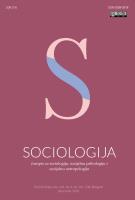KRITIČKA ANALIZA DISKURSA JUŽNJAKA NA RTS-U – PRIMER SERIJE „PORODIČNO BLAGO” –
Critical analysis of discourse of the people from the South of Serbia on the national television (RTS) – TV show „Porodično blago” –
Author(s): Marija ManasijevićSubject(s): Language and Literature Studies, Applied Sociology, Sociology of Culture
Published by: Sociološko naučno društvo Srbije
Keywords: dialect; critical discourse analysis; stereotypes; public speaking practice
Summary/Abstract: When observing the relation between the standard language and language variety, the hegemony of standards which implies the ideological foundation of its prestige cannot be discarded. Respecting the language standards, one shows his or her own social status in a certain way, being able to accommodate to the rules of public discourse regardless of the part of the country he or she comesfrom. A person can position themselves on the social ladder of power and prestige by using the ‘pure’ language in formal situations. The underlying problem of this paper is discourse analysis of the language used by the people from the South of Serbia in the TV show „Porodicno blago” which has been conducted in accordance with the principles of the critical discourse analysis. The selected examples have been analyzed on three levels: text, discursive practice and social practice. According to the analyzed discourse examples we can infer that there are two basic ways of portraying the people from the South of Serbia. The first type is represented by the character of Tika Spic, who is the personification of a primitive, uneducated, resourceful and unscrupulous man. In contrast to that, the second type is naive, openhearted, primitive, passionate and hedonistic. The thing in common for both types of southerners is honouring the traditional values, which includes patriarchy connected to the lack of education, frugality and incivility in the broadest sense of the term. This paper discusses the ways of relativisation of these stereotypes by the means of the principles of sociolinguistic activism.
Journal: Sociologija
- Issue Year: 58/2016
- Issue No: 4
- Page Range: 612-630
- Page Count: 19
- Language: Serbian

